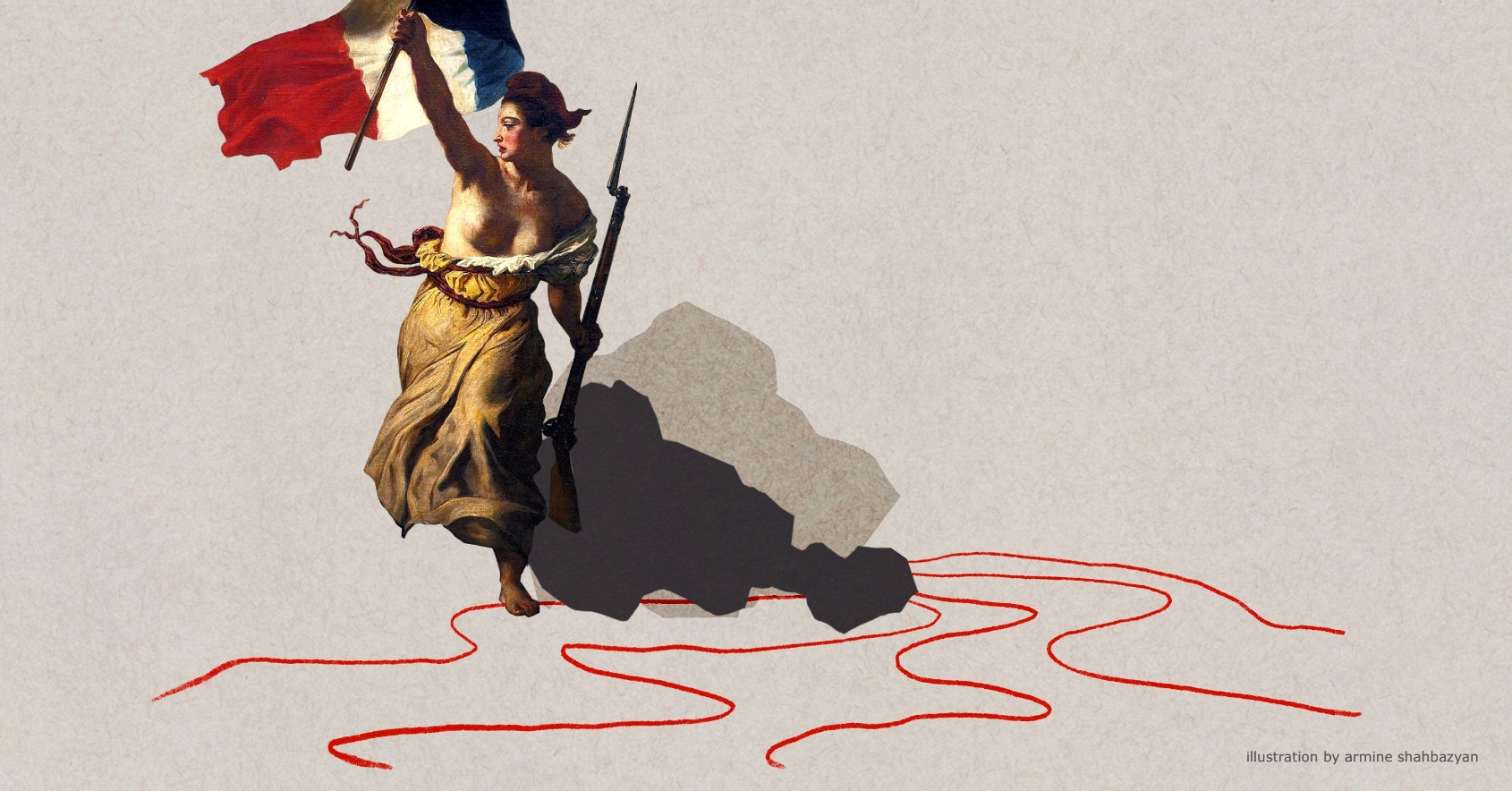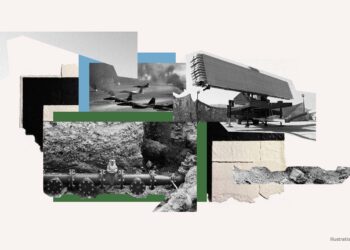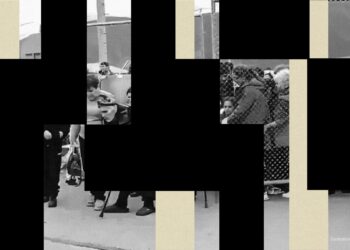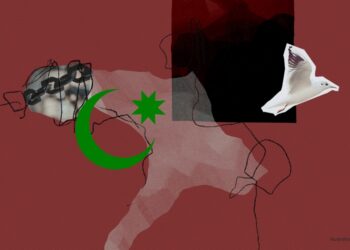
Listen to the article.
Azerbaijan’s campaign of disinformation and false narratives against France has escalated into a hybrid war, reaching as far as the South Pacific and Africa. This may seem surreal to many, but for those closely tracking Azerbaijan’s intensifying rhetoric and actions against France since 2020, which escalated further in 2023, it is not surprising.
It is no secret that the deteriorating relationship between France and Azerbaijan stems from the growing partnership between France and Armenia. Over the last two years, Azerbaijan has employed tactics of harassment against any international actor supporting Armenians. Baku has targeted the EU, its mission in Armenia, its individual member states, the U.S., international, intergovernmental and non-governmental organizations and watchdogs, scholars, analysts and journalists. It is trying to ensure impunity for the blockade, military offensives, large-scale war and the eventual ethnic cleansing of Armenians in Nagorno-Karabakh. It is also aiming to evade accountability for its military offensives and creeping annexation in sovereign Armenia while continuing its expansionist demands towards Armenia.
Azerbaijan has become particularly hostile towards France due to its consistent support for Armenians and criticism of Azerbaijan. Azerbaijan’s campaign of disinformation regarding France’s partnership with Armenia gradually escalated into a broader campaign against France. Its style is characteristic of an illiberal autocratic regime and mirrors Russia’s similar campaign in Africa and the European neighborhood.
This article aims to debunk the false Azerbaijani narratives concerning the Armenia-France cooperation, highlighting their similarities with Russian narratives, as well as the methods and platforms through which they are promoted.
The Dynamics of the French Position in the Armenia-Azerbaijan Conflict
Undoubtedly, the primary cause of Azerbaijan’s hybrid war against France is the French criticism of Azerbaijan’s war, blockade and ethnic cleansing in Nagorno-Karabakh, and its support for Armenia after Azerbaijan’s military offensives and strategy of coercion against Armenia.
While the U.S. and the EU employed soft mediation based on “liberal peace theory” between Azerbaijan and Armenia, France occasionally deviated from the false equivalence policy characteristic of other actors since the 2020 war launched by Azerbaijan against Nagorno-Karabakh Armenians, particularly during the Azerbaijani military offensives against Armenia in 2021-2022.
In October 2020, during the 44-day war launched by Azerbaijan against Nagorno-Karabakh Armenians, France, the U.S. and Russia each negotiated a ceasefire throughout the war. However, Azerbaijan violated these agreements each time until it accepted a deal negotiated by Russia under highly unfavorable terms for Armenia, without consulting the U.S. and France.
In December, the French National Assembly adopted a resolution recognizing the independence of Artsakh (the Armenian name for Nagorno-Karabakh), based on a motion submitted during the war in October. However, the French executive branch distanced itself from this resolution not willing to sabotage its role as a co-chair in the OSCE Minsk Group, the formal mediation body for the Nagorno-Karabakh conflict.
In 2021, France deliberated whether to balance its mediation role or to provide explicit political support and defensive military equipment to Armenia. For the defense cooperation, there was also another obstacle — Armenia’s membership to the Russian-led Collective Security Treaty Organization (CSTO). Meanwhile, Azerbaijan began sabotaging the OSCE Minsk Group, arguing that the Nagorno-Karabakh conflict had been resolved through military means and initiated military intrusions into Armenia. During that period Russia monopolized the mediation role between Armenia and Azerbaijan and continued sidelining the U.S. and France, other OSCE co-chairs as it had already started by the trilateral ceasefire statement signed on November 10, 2020.
President Macron, along with the President of the EU Council Charles Michel, facilitated a new mediation format between Armenia and Azerbaijan in December 2021 as an alternative to Russian mediation. However, Azerbaijan aimed to exclude France following the first meeting. The EU’s softer mediation was more advantageous for Azerbaijan’s coercive strategy to promote its maximalist goals regarding Armenia, given the absence of military parity between the parties. Eventually, it launched a major military offensive in Armenia in September 2022 and occupied more areas in Armenia’s border regions.
In response to the Azerbaijani incursion into Armenia, the EU and France convened a meeting with Armenia’s Prime Minister Nikol Pashinyan and Azerbaijan’s President Ilham Aliyev in Prague in October 2022. They underlined the notion of territorial integrity for both Armenia and Azerbaijan at that meeting. The EU committed to deploying a short-term monitoring team in Armenia in October 2023. Subsequently, France and Germany played a lead role in advocating for a long-term EU monitoring mission in Armenia (EUMA) that was launched in February 2023. Since then, the EUMA provides a soft deterrent for Armenia’s border security in the face of Azerbaijan’s attempts to continue military offensives and creeping annexation of Armenia’s border regions. Azerbaijan and Russia tried to prevent the deployment of this mission through a coordinated campaign of false narratives, and Russia tried to promote the deployment of CSTO monitors instead. Until now, they continue to conduct a systematic campaign of disinformation against the EUMA.
Evolution of French Support for Armenia Amid Azerbaijan’s Aggression
In an October 2022 interview with France 2 TV station, President Macron criticized Azerbaijan for its military offensives against Armenians in Nagorno-Karabakh and Armenia. He pledged that France would not abandon Armenia and pointed out that Russia is “destabilizing” and “seeking to create disorder” in the peace process between Armenia and Azerbaijan. As a permanent member of the UN Security Council (SC), France has initiated the majority of SC emergency meetings concerning Azerbaijan’s military incursions in Armenia and the blockade in Nagorno-Karabakh. France’s statements regarding these developments have been more principled and strongly worded than those of the EU and the U.S., which often attempt to maintain a balance between the two sides, despite Azerbaijan’s use of military force and blockade for expansionist purposes.
The French government, unlike the legislature, has underlined the principle of territorial integrity not only for Armenia but also for Azerbaijan, focusing on the importance of ensuring the rights and security of Nagorno-Karabakh Armenians and not supporting their aspirations for independence. Regional French authorities have taken bolder initiatives to support Armenians in Nagorno-Karabakh. While the U.S. and the EU did not attempt to send humanitarian assistance to Nagorno-Karabakh during its blockade by Azerbaijan even when starvation began in July 2023, the mayor of Paris and several French parliamentarians, as a regional initiative, brought a humanitarian convoy for Armenians in Nagorno-Karabakh in August 2023. However, Azerbaijan’s border services banned this aid from entering the territory. The French Government then allocated 29 million euros in humanitarian aid to Armenia in September 2023, followed by an additional 15 million euros in emergency aid in December to support Armenians displaced from Nagorno-Karabakh.
In October 2023, following Azerbaijan’s final military offensive in Nagorno-Karabakh which led to the dissolution of the de facto state and the forced displacement and ethnic cleansing of Armenians, French Foreign Minister Catherine Colonna visited Armenia and Azerbaijan. She pledged to provide military equipment to Armenia given the country’s need for self-defense. Later in October, France announced its first sales of military equipment to Armenia. This made France the first NATO and EU country to break the taboo of supplying military equipment to Armenia, which remains a formal CSTO member even if it has effectively frozen its membership. Aliyev gave a fierce response, stating that France’s supply of weapons to Armenia would not promote peace, but rather incite a new conflict. He added that if any new conflict arises in the region, France would be responsible.
Using the forthcoming defense cooperation between France and Armenia as a justification, Azerbaijan boycotted the meeting with Armenia facilitated by the EU, U.S., France and Germany on the sidelines of the European Political Community summit in Granada in October 2023. This was also after Germany and France opposed the participation of Turkey, which was a demand put forth by Azerbaijan. Baku stated any format involving France was unacceptable due to its “pro-Armenian statements”. The Granada meeting resulted in a statement supporting Armenia’s independence, sovereignty, territorial integrity and inviolability of borders. Baku started boycotting the Western mediation between Armenia and Azerbaijan and made new expansionist claims to Armenia.
On January 17, 2024, the French Senate passed a resolution condemning Azerbaijan’s military operation against Armenians in Nagorno-Karabakh in September 2023, leading to ethnic cleansing and destruction of Armenian cultural heritage. It also condemned the occupation of border areas of Armenia by Azerbaijan between 2021 and 2023. This resolution was not the first of its kind. The European Parliament, the Parliamentary Assembly of the Council of Europe, and several EU member states also passed similar resolutions between 2023 and 2024. These resolutions prompted a strong reaction from Azerbaijan, which sought to evade accountability for its actions.
French commitment to supporting Armenia’s sovereignty was highlighted in President Macron’s New Year address to the French diplomatic corps and Armed Forces in January 2024. The French president expressed solidarity with Armenia and urged Azerbaijan to “respect Armenia’s territorial integrity without any ambiguity” in the joint press conference with Pashinyan in Paris in February 2024. He also called attention to the International Court of Justice’s orders for Azerbaijan to ensure the right of return for Nagorno-Karabakh Armenians.
In February 2024, the French Minister of the Armed Forces Sébastien Lecornu visited Armenia. It was the first ever visit of a head of the French defense ministry to Armenia. He delivered military equipment and signed defense cooperation deals. These included providing armored vehicles, arms, munitions, and improving air-defense capabilities. Both Paris and Yerevan emphasized the defensive nature of these capabilities. At a joint press conference with President Macron in Paris in February 2024, Pashinyan stated that Armenia aims to “form the right balance in the region” by protecting its “legitimate, sovereign, internationally recognized territory, borders, territorial integrity, and independence.”
In March 2024, the newly appointed French Prime Minister Gabriel Attal noted that Russia planned to “punish” Armenia for aligning with the West. Thus, France expressed its support for Armenia, not just against Azerbaijan’s territorial expansionism but also against Russia’s attempts to undermine Armenia’s sovereignty. This stance aligns with France’s support for the sovereignty of Moldova and Georgia. The newly appointed French Foreign Minister Stéphane Séjourné has compared Azerbaijan’s actions against Armenia to Russia’s aggression toward Ukraine, saying that such behavior warrants closer scrutiny, which was an important narrative for shaping the attitude of the EU and the U.S. to Azerbaijan’s expansionism and use of force against Armenia.
Unveiling the Deceptive Azerbaijani and Russian Narratives on France’s Support for Armenia
The evolving relationship between France and Armenia has consistently sparked negative reactions from Azerbaijan. This is evident in multiple strongly worded statements made by Aliyev, the Foreign Ministry, and their propaganda outlets. However, it became particularly aggressive when France decided to launch a defense cooperation with Armenia. Azerbaijan started accusing France of helping Armenia in “preparing the ground [for] new wars” and “undermining peace efforts.” The Azerbaijani MFA responded by saying “France’s insidious policy of inflaming new tension in the region, and hindering peace and stability will not yield any results.” In April 2024, Aliyev warned: “We cannot sit idly by while France, India, and Greece arm Armenia against us. They are doing this openly and demonstratively, obviously trying to prove something to us in this way… If we see a serious threat to us, we will have to take serious measures.”
This narrative is entirely false because even after its military victories in Nagorno-Karabakh and incursions into Armenia’s border regions between 2020 and 2023, Azerbaijan had continued to aggressively arm itself and develop its military infrastructure. It received a steady supply of offensive armaments and military equipment from countries like Israel, Turkey, Pakistan, Italy, Serbia, Bulgaria, among others. The defensive military equipment provided to Armenia by France is limited and cannot be compared with the enormous volumes of armaments and military equipment that Azerbaijan procures from other countries. However, Azerbaijan started questioning Armenia’s right for self-defense, thus contradicting the UN Charter entitling each member country not only with a right but also with an obligation to defend its territory and people.
Azerbaijani propagandists have also claimed that Armenia “is seeking a new master” to replace Russia, suggesting that it cannot be a truly sovereign country. This perspective overlooks the fact that France has neither promised Armenia to send troops to defend Armenia nor is it trying to make Armenia dependent on it. Rather, France is aiming to help Armenia reduce its dependence on Russia, strengthen its sovereignty, and rebuild its defense sector through building its capabilities and capacities. As Olivier Decottignies, Ambassador of France to Armenia noted, “Armenia-France long-term cooperation, including cooperation in the field of defense, is not only about military procurement, which is of course important but also about training, including the training of senior Armenian officers.”
The Russian Foreign Ministry has begun echoing these narratives, reflecting its increasing alignment with Azerbaijan against Armenia. In March 2024, the ministry’s spokeswoman Maria Zakharova stated that France was trying to solidify its presence in Armenia to “spy on neighboring states and prevent peace agreements with Azerbaijan from being implemented.” Moscow also suggested it would be “naive” to believe that Paris could ensure Armenia’s security. Russia accused France of failing its peacekeeping role in African countries and of now trying to compensate with a peacemaking role in the Caucasus, guided by geopolitical ambitions.
Azerbaijan, Russia and Turkey advocate for regionalism, insisting that Armenia should focus on developing relations with regional countries and actors, rather than “external actors”, like France, the U.S. and the EU to achieve peace, security and prosperity. They are opposed to Armenia enhancing its defense system and reducing its dependence on Russia, as this would balance the power dynamics with Azerbaijan. They aim to prevent this in order to enable Azerbaijan to impose its expansionist demands on Armenia, either through threats or actual use of force, and hinder the strengthening of Armenia’s security and sovereignty. According to Altay Goyushov, a rare independent political analyst in Azerbaijan, “it was very frustrating for Ilham Aliyev, who wants to be able to impose his demands on a weak Armenia, which is not the case if Yerevan thinks it can count on French support.”
Azerbaijan and Russia want to see a diplomatically isolated and unsupported Armenia that is unable to defend its border security against military aggression, in order to continue to challenge Armenia’s territorial integrity and sovereignty, and impose their hegemony over it. They are also interested in keeping Armenia dependent on Russia that doesn’t support Armenia against Azerbaijani aggression but aligns with Azerbaijani claims and narratives to keep Russian political influence and military presence in Armenia.
Moreover, the false narratives employed by Azerbaijan and Russia about France-Armenia cooperation go beyond rhetoric and disinformation campaigns. Recently, Azerbaijan has employed more aggressive and largely unexpected hybrid warfare tactics against France. Baku manipulates anti-colonial sentiments and the aspirations for self-determination of local populations in French territories in the South Pacific and anti-colonial resentment against France in Maghreb and Sub-Saharan Africa. These tactics will be presented in upcoming articles.
Also see
Can the West Be a Reliable Partner for Armenia? Part I
While Armenia undertook a “huge strategic shift” toward the West two years ago, the question of the reliability of the partnership with Americans and Europeans remains unresolved, writes Gaidz Minassian.
Read moreCan the West Be a Reliable Partner of Armenia? Part II
In Part II of a two-part series examining Armenia’s pivot to the West, Gaidz Minassian examines the question of the reliability of the partnership with Americans and Europeans.
Read moreHungary: Baku’s Friend in Brussels
Hungary recently blocked EU assistance to Armenia through the European Peace Facility, yet another move highlighting its strategic alignment with Azerbaijan, from supporting Baku's actions in Nagorno-Karabakh to blocking EU statements condemning them to extraditing a convicted murderer more than a decade earlier.
Read moreAzerbaijan-Israel Relations: Implications for Armenia
The deepening alliance between Azerbaijan and Israel carries significant implications for Armenia, notably Azerbaijan's considerable acquisition of advanced Israeli weaponry which it has extensively employed against Armenian forces in the past decade.
Read moreEthnic Cleansing, Genocide or Displacement?
This article explores the most accurate term to describe the de-Armenization of Nagorno-Karabakh by comparing various perspectives and examining the legal and political applicability of these terms.
Read moreAliyev Uses Religion to Hide His Dictatorship
Allegations against European institutions of being Islamophobic, a serious assertion by Azerbaijan, is part of a much larger anti-West campaign which is often insufficiently understood and analyzed by Western partners, writes Tatev Hayrapetyan.
Read moreTowards a Franco-Armenian Strategic Partnership?
The Coordinating Council of Armenian Associations in France recently hosted its annual dinner in Paris against the backdrop of heightened geopolitical tensions and concerns over Armenia's security. The focus shifted to the role of France in implementing deterrence measures and sanctions against Azerbaijan.
Read moreHow Azerbaijan Deceives and Harasses the International Community
Azerbaijan has been using military and diplomatic coercion to achieve its maximalist and expansionist objectives, employing wide-ranging tools of hybrid war while also deceiving and harassing international actors. Sossi Tatikyan explains.
Read moreBeyond India and France: Armenia’s Quest to Diversify Defense
In the past year, especially since the major Azerbaijani incursion into Armenia in September 2022, the Armenian government has made diversification of the country’s security, including arms procurement, a priority. Hovhannes Nazaretyan explains.
Read more










Brilliant, fact based article!